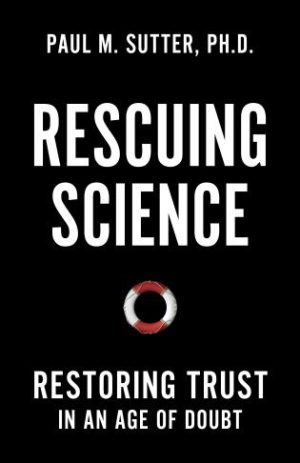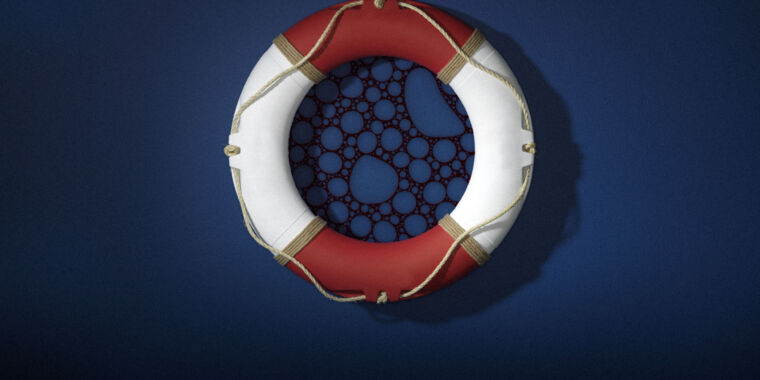Alrich Lawson | Getty Images
Saving Science: Restoring Trust in an Age of Doubt was the most difficult book I’ve ever written. I’m a cosmologist, studying the origin, structure, and evolution of the universe. I love science. I live science, I breathe science. If science was breakfast cereal, I’d eat it every morning. And in the midst of the COVID-19 pandemic, I watched with alarm as the public’s trust in science collapsed.
But I didn’t know how to change people’s minds. I didn’t know how to convince them to trust science again. So when I started writing the book, I reversed the question: Is there anything we can do to make the institution of science more trustworthy?
The short answer is yes. The long answer would take up a book in its entirety. This book explores the various sources of distrust (the obstacles scientists face when trying to communicate with the public, the lack of long-term career prospects, scientists’ complicity when their work is politicized, etc.) and suggests proactive steps to address these issues in order to rebuild trust.
The following section explores the relentless pressure scientists face to publish and the associated A surge in fraud The misconduct that this pressure creates can take many different forms. Misconduct can range from “hard misconduct” – the complete fabrication of data – to a variety of “soft misconduct” such as plagiarism, data manipulation, and careful selection of methods to achieve a desired outcome. The more widespread misconduct becomes, the more the general public loses confidence in science. Addressing this problem will require fundamental changes in the incentive and reward structures in which scientists engage. It is certainly a difficult task, but not impossible. And I am convinced that it will be worth the effort.
Modern science is hard and complex, built over many layers and years of effort, and it is, in almost every respect, computationally based. Apart from a few (very few) die-hard theorists who insist on writing things down with pen and paper, it is almost guaranteed that every paper you are likely to read in any scientific field involves a computer at some stage in the process.

Whether studying bird droppings or galactic collisions, the very existence and continued survival of modern science is thanks to computers. From laptops on messy desks to giant machines filling rooms, “S. Transistor” should be a co-author on nearly all 3 million academic papers published each year.
The complexity of modern science and its reliance on customized software renders one of the first lines of defense against soft and hard fraud useless: peer review.
The practice of peer review developed in a different era, when the arguments and analysis that lead to a paper’s conclusions could be concisely summarized within the paper itself. Want to know how the authors reached their conclusions? The derivation of the conclusions is in the paper. It was relatively easy to determine what was “wrong” with a paper, because you could follow the document from start to finish, start to finish, and all the information you needed to evaluate was at hand.
The modern scientific enterprise relies so heavily on computers that this is now nearly impossible.
To make matters worse, much of the software code used in science is not publicly available. It’s crazy to even think about, so let me say it again: every year millions of papers are published that use computer software to produce results. But that software is not available for other scientists to vet and verify that it is legitimate. We have no choice but to trust it, and “trust” is a word that is pretty low on scientists’ priorities.
Why don’t scientists publish their code? It comes down to the same reason scientists don’t do much to improve the scientific process: there’s no incentive. In this case, you don’t get h-index points for publishing your code on a website; you only get them for publishing a paper.
This frustrates me to no end when I peer review papers: how can I judge the accuracy of a paper if I can’t see the entire process? What’s the point of looking for fraud if the computer code behind the published results can be tweaked to get any desired result and no one will notice?
I’m not talking about intentional computer-based cheating here. This is a matter of even detecting basic mistakes. If there’s a mistake in the paper, the peer reviewers and editors will see through it. And science is better for it. If there’s a mistake in the code… who’s going to check it? As long as the results look correct, you go ahead and publish it, and the peer reviewers will go ahead and accept it. And science is worse for it.
Science is getting more complex over time, with an increased reliance on software code to keep the engine running. This makes it easier to commit fraud, both hard and soft. From making mistakes that go too fast and are missed, to using sophisticated tools that we barely understand to get the results we want, to outright faking, science is getting more and more wrong.


